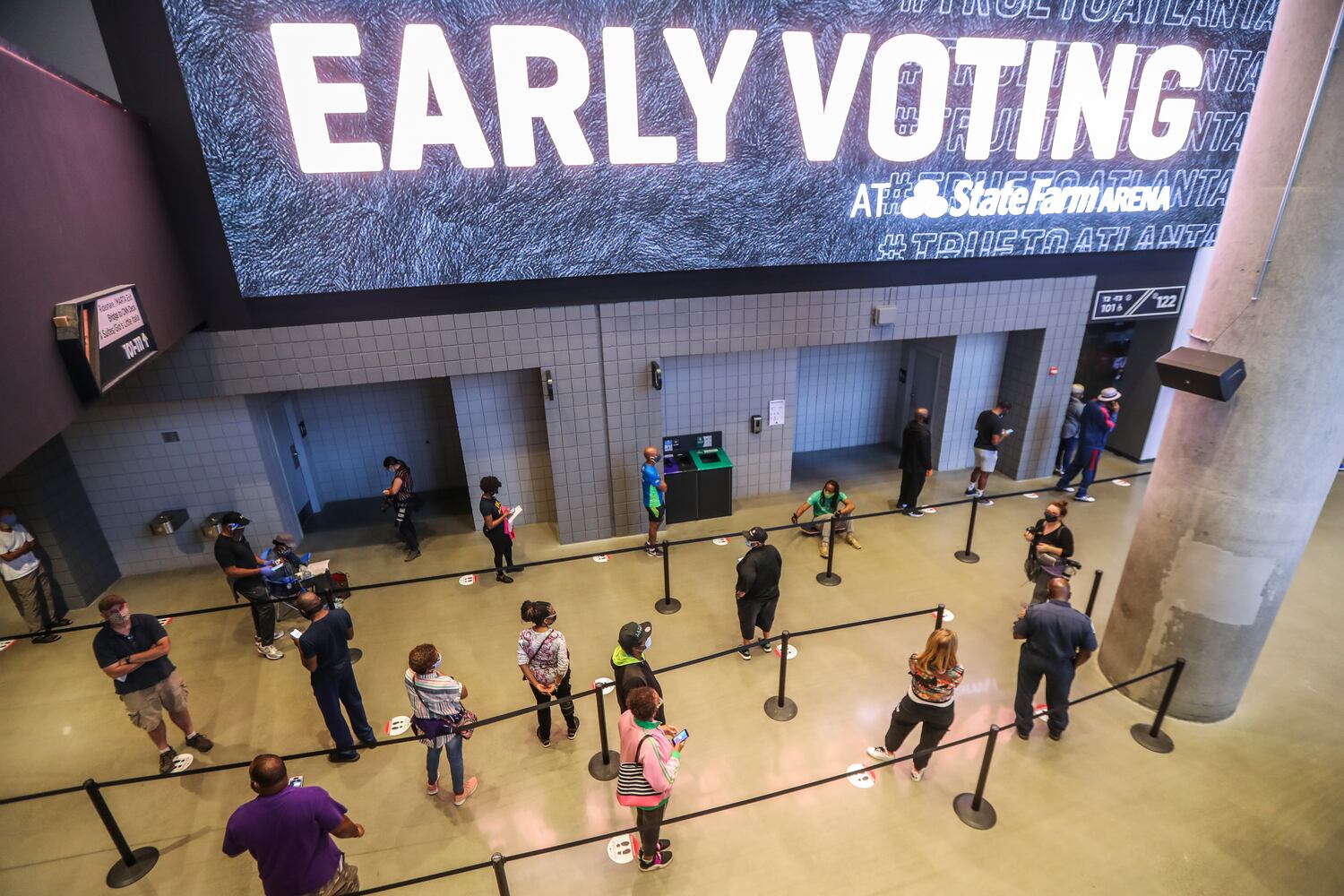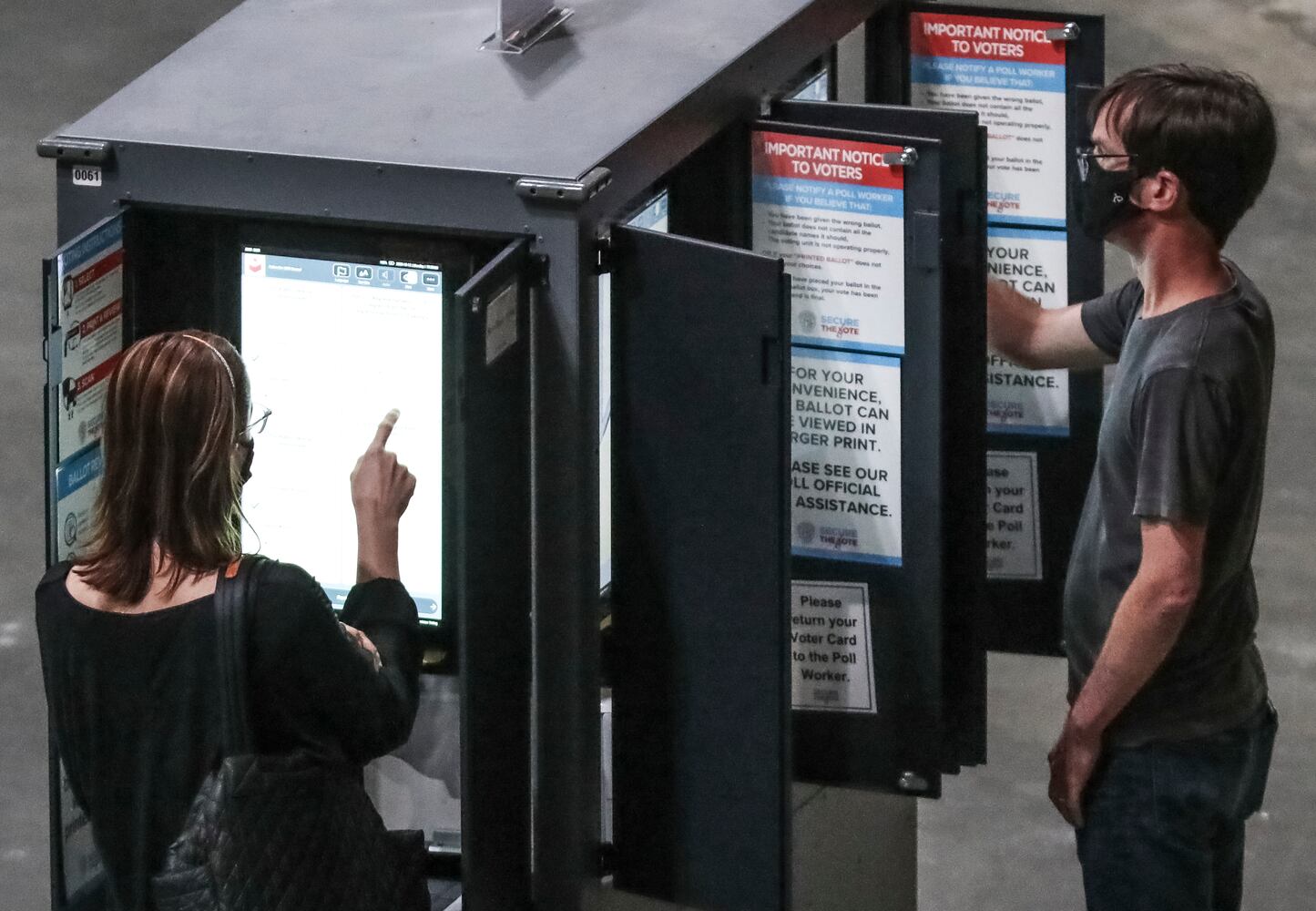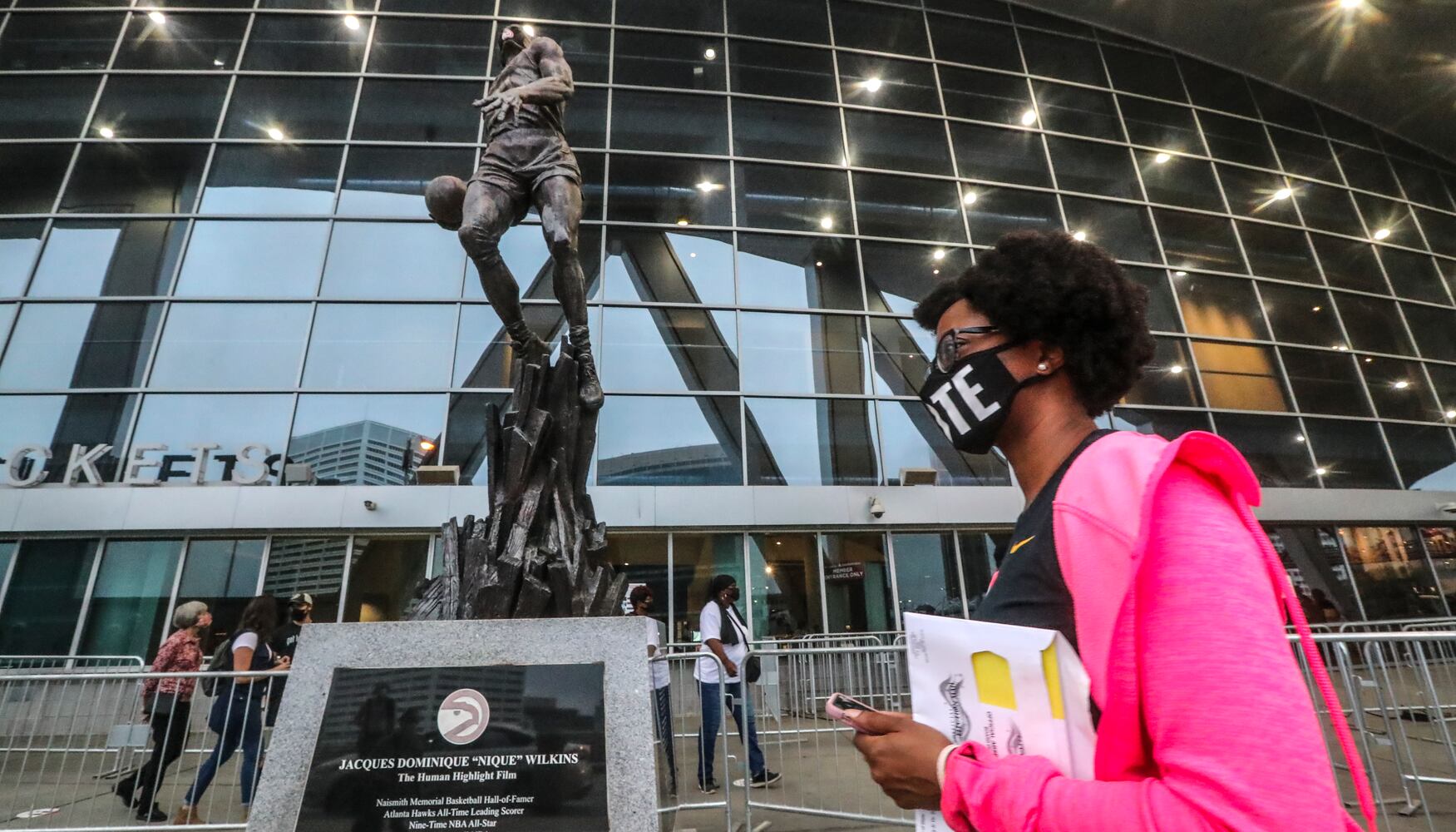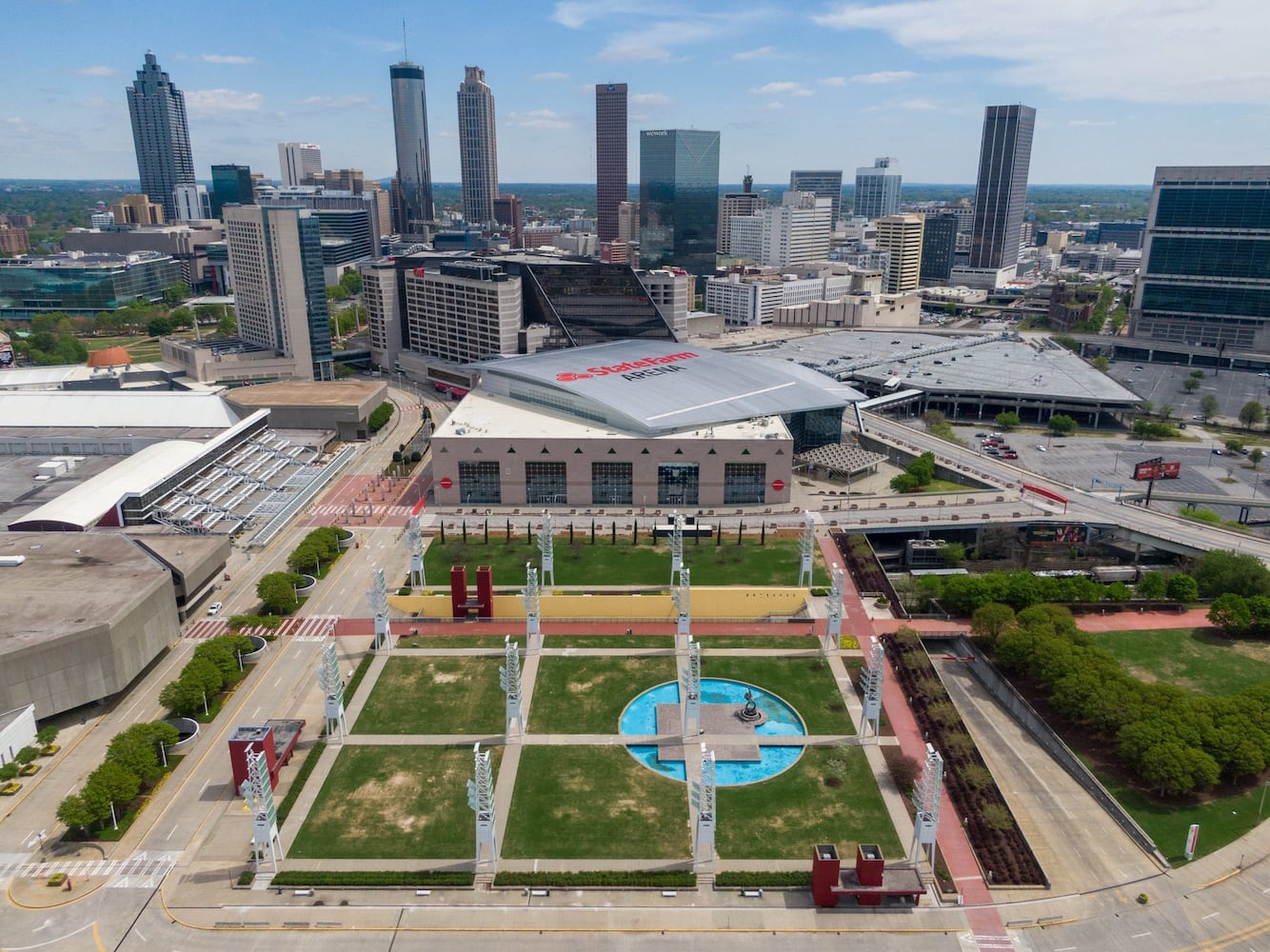Hawks CEO Steve Koonin knew that transforming State Farm Arena into the largest-ever voting precinct in Georgia would help solve a logistical problem, especially given the venue’s size during this time of social distancing amid the pandemic.
What he didn’t expect is the emotional outpouring from Fulton County voters, who have reached out via email, phone and handwritten letter to express gratitude.
“It really struck a cord with people, and I didn’t anticipate that,” Koonin said. “I anticipated utility, function, service. And then the service piece has really stood out, that it’s been hospitality here, besides young, friendly faces, driving people from the parking lots, and even down to the uniqueness of the sticker, has resonated with people.”
What began as an idea of Koonin’s after watching protests unfold in downtown Atlanta in June in the wake of George Floyd’s death ultimately transformed into 20 days of early voting at State Farm Arena, which began Oct. 12 and concluded Friday. The nearly three weeks of early voting were largely a success, with minimal lines and wait times throughout that period (the only hiccup was a technical problem on Day 1; it was resolved within an hour and a half because the Hawks had manufacturing reps on site to help with a Poll Pad configuration issue).
Overall, approximately 40,000 people voted early at State Farm Arena.
The Hawks self-staffed the arena; that plus their 700,000 square-foot building helped make the initiative successful — in short, they had the infrastructure in place to handle massive crowds.
“We’ve finished No. 1 in the NBA two years in a row in overall fan experience,” Hawks vice president of facilities Geoffrey Stiles said. “We are very good at taking care of people. So we have the ability because we understand the flow of the arena, we understand how it’s best utilized, we have the ability to get people through safely, with social distancing, and efficiently."
When voters arrived prepared for long wait times, a common occurrence in Fulton County during the June primary, getting in and out was a welcome change of pace.
“They come out and they’ve got their chairs with them and they’ve got their books with them and it really kind of excites us to be able to say ‘Guess what? There’s no wait. Come on in,’” Stiles said.
Credit: HYOSUB SHIN / AJC
Credit: HYOSUB SHIN / AJC
The Transformation Process
The Hawks haven’t played basketball since March 11, when the season was suspended because of the coronavirus. So, State Farm Arena had been dormant for quite some time when the June primary came along, which the Hawks chose to view as their “preseason," as about 2,000 people voted at the arena.
“We got to see, in a less-stressful environment, what are the important parts of the process that we want to influence,” Hawks VP of Experience and Innovation David Garcia said.
Fulton County helped train more than 200 Hawks employees as election workers, and factoring in support staff, they had about 300 employees contributing. To get firsthand experience, poll managers shadowed Fulton County staff during September’s special election.
It’s a big undertaking, but doable when the team is still out of season (the 2020-21 season normally would have started in October, but has been pushed back and still does not have a definitive start date).
“I don’t think any of us knew how hard it is,” Koonin said. "We see where everybody’s voting, and usually most of these places are getting 300 to 600 people a day. We’re getting 10 times that. The amount of paperwork is just enormous, and everything has to be reconciled.”
In becoming an early-voting site, Koonin came up with the term “library on steroids” as the goal, basically taking the standard voting experience and trying to make it more efficient (plus taking safety precautions in light of COVID-19). The Hawks certainly received publicity from becoming a voting precinct, but they turned down several celebrity appearances and other entertainment ventures, per Koonin.
They had free parking sites, golf carts taking some voters to and from parking decks to the arena, security outside the doors, greeters directing foot traffic upon entry and developed their own “Georgia Voter” sticker featuring a peach-shaped basketball.
“It’s not our goal to set a (turnout) record, our goal is to be informational,” Garcia said. “We’re not pushing our brand on people, this is all about voting and giving people access to vote.”
Even though the process has been demanding and the expense has been “significant,” it has been worth it for the Hawks for a few reasons, Koonin thinks, including acting as a civic asset and making a good impression on people in Fulton County.
Voter experience
Working as a greeter, Hawks coach Lloyd Pierce watched thousands of voters come through the arena.
Seeing the amount of people able to easily cast their ballot made an impact on him, but as he’s struck up conversation with them, it also becomes emotional when they have a good experience.
“It’s emotional, it’s powerful, you feel like you’ve done the right thing, especially when you see people come through nervously and then exit out excited,” Pierce said. “Just in that short period of time you can see a full progression of energy from the people that are voting here.”
The most common feedback he’s received from people in the arena is how fast they were able to get in and out, which seemed to be a trend.
Brock Perry, who lives in the Alpharetta area, decided to vote at State Farm Arena, saying he viewed it as a safe place to vote, thought it would make for a fun experience and wanted to support the Hawks' efforts in hopes it would encourage them to offer the venue for voting again.
He voted early-afternoon Oct. 15 and said it took him 10 minutes from start to finish.
“Staff were fantastic, and the process was seamless,” Perry said in an email.
Outside of that first-day glitch, there were no more big technical problems to slow voting.
“The one thing we said throughout this process was, there’s a lot we can control, but there’s one aspect that we can’t, and that’s the technology, and that’s provided as part of the voting systems,” Garcia said. “... What looked like it could have been a big issue actually ended up being more of a 90-minute delay and we were back up and running, and really it’s been seamless since then.”
When asked for feedback on their experience, many voters commented on the speed of voting, the size of the arena, the benefit of free parking and the unique experience of voting in an arena that houses a professional sports team.
Jarrett Smith, who lives in the Camp Creek area, commended the Hawks for simplifying voting.
“Luckily I live in Fulton County, so I was able to vote there and everything was so simple and efficient,” Smith said via Twitter direct message. “Free parking was great. Lines weren’t long. And voting on top of Hawks basketball court is a voting experience I will never forget.”
Will Wynne, who lives downtown, said on Twitter he was able to walk over to the arena to vote.
“It was super quick and easy, we were in and out in like 10 minutes,” Wynne tweeted.
Patrick Broderick said on Twitter he took MARTA to the arena, waited in line for about three minutes, had a pleasant experience with poll workers and brought his two children with him.
Giving voters of all kinds a safe place to cast their ballot was a priority, per Koonin, without taking a political stance as an organization.
“This is an absolute bipartisan effort that is about the utility and safety of voting,” Koonin said. “And back to the library, we don’t take a stand, we don’t take a point of view. … It’s about accommodation, and this year, it’s space. You walk in here and the logic hits you in the face. ‘Oh, I get it, it’s huge.’”
The next chapter
Why hasn’t this been done before, and what parts can be replicated in the future?
The first answer is easy — the Hawks typically would be in-season for general elections, unable to offer up their arena for three weeks. The second answer is more open-ended.
Even if the Hawks can’t directly use their arena, they might be able to package together some information on voter hospitality for counties in metro Atlanta, Koonin thinks.
“I don’t have a four-year crystal ball,” Koonin said. “I personally would love to see us do it. And when I say us, I mean the NBA. I would like to see this be part of our DNA for every reason why it worked this year, giant buildings, (we’re) in the hospitality, large-crowd business for our core, city centers, people know where they are, and also trust the buildings."
Several NBA teams and arenas followed in the Hawks' footsteps, with Charlotte’s Spectrum Center, Detroit’s practice facility and Los Angeles' Staples Center on that list.
In the immediate future, the Hawks plan to sit down with the Secretary of State to discuss what worked best and the changes they made to improve the voting process.
“We saw which process was the fastest, which process was the slowest, and we optimized based on that,” Garcia said. “So there’s a lot of feedback we can provide the state and things that we learned, and they seem very receptive and open to taking that.”
Even if it’s not realistic for the Hawks to continue using their arena as a voting precinct, they still plan to encourage voter participation in the future.
“I hope it’s not possible to offer three full weeks of emptiness in an arena, but I do think we’ll continue to commit to encouraging voter participation in any capacity we can,” Pierce said.
“I think the beauty of what we saw here is that it’s needed and it’s possible if done the right way. How and what we’ll do remains to be seen, but I’m sure we’ll be involved in some capacity, and we should.”
About the Author
Keep Reading
The Latest
Featured






